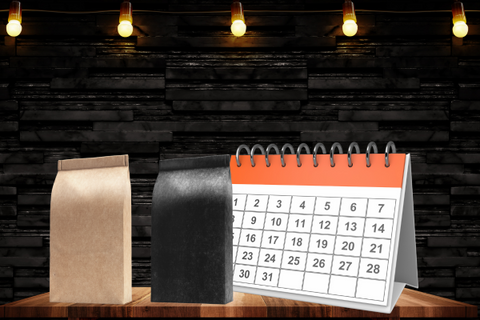How Long Do Coffee Beans Last?
You want to know how long coffee beans last? Not long in my house, haha!
I do realise that you're probably talking about shelf life, but there's a few answers to this, depending on what you mean exactly with this question.
Shelf Life Vs Vibrancy - Commodity Vs Speciality

The first thing to ascertain if you’re asking the question “how long do coffee beans last” is exactly what you mean by that.
Do you mean how long can you safely use coffee beans without them being potentially dangerous to your health, or do you mean how long will they taste great for?
If you’re talking about commodity coffee (big brand & supermarket own brand coffee) then you’re probably referring to shelf life rather than taste life.
If you’re referring to high quality freshly roasted coffee (the only kind of coffee beans you’ll find around here) then you’re probably referring to how long they’ll taste great for.
The Shelf Life of Roasted Coffee beans
Coffee beans are a cooked food product, they’re the roasted seeds of coffee trees, so it would make sense that they’d have a shelf life.
I mean, surely you can’t open a bag of coffee beans two years after it was sealed, make coffee with it & drink it, without becoming violently ill?
Actually, so long as coffee beans haven’t been exposed to moisture and air, leading them to develop mould, theoretically it’s safe to drink coffee beans that have been kept sealed, pretty much indefinitely.
They might not taste all that exciting, but how long they’ve been sitting in the bag, as long as it was sealed, won’t actually impact on the safety of consuming them, in theory at least.
The huge numbers of compounds that coffee contains, will wither away over time, so I wouldn’t expect to get much at all from a 5 year old bag of coffee, but as long as they look fine and haven’t become furry or become infested with some form of life, it’s doubtful that they’re going to pose any kind of a threat just due to their age.
It would make sense to think there would be a law to state how long a shelf life (sell by date or best before date) should be on coffee beans, given that they are after all, a cooked foodstuff, but there isn’t actually a law (not in the UK at least, and at the time of writing) to say how long this should be, just that a date has to be stated.
So if this is all you wanted to know, literally how long can coffee beans be consumed for as long as the bag has been sealed, then the answer is forever, theoretically.
If you have a 100 year old bag of coffee beans, send them to me, that would make for a great YouTube video :-).
Is this why your coffee tastes bad?
How Long is The Best Before Date on Coffee Beans?
It’s common for coffee beans in supermarket beans to have a 12 months best before date, but some brands assume a longer shelf life, it’s not uncommon for beans to have a 2 year long best before date, for example.
When it comes to speciality coffee, it’s the roasted on date that you’d usually be focusing on, rather than the best before date.
Our coffee is roasted daily, so the roasted on date is usually the day of dispatch, sometimes the day before, but rarely earlier than that.
We put a roasted on date on our bags of coffee, along with the best before date, and the best before date is 6 months from the roasted on date, but we believe they're at their best from 1-4 weeks from the roast date.
How Long do Coffee Beans Taste Good For?

Now this is a slightly different question, and again it depends which kind of coffee beans you’re referring to.
If we’re talking about high quality, freshly roasted coffee beans, then we believe they’re best enjoyed from around 1 - 6 weeks from roast date.
It’s usually best to let the coffee rest for 1-2 weeks from roasting, and from opening, as long as you're storing your beans well, they will be fine for up to around 4 weeks, and even after this they won't suddenly go stale, they'll just taste slightly less vibrant as time goes by.
Re "storing your beans well", I mean airtight storage, away from heat & light.
It's fine to keep your beans in our bags, as long as you make sure the re-seal strip is properly sealed, and just gently expel the trapped air via the one way valve.
How to store your coffee beans correctly
We don’t tend to have problems with customers drinking our coffee when it’s too old, it’s actually the other way around ;-).
As we roast daily, when Royal Mail do their job well you might get it when it's only a day or two from roasting, and while it’s OK to use at this point, it’s still in the most volatile stage of the degassing process, so it’s more difficult to extract well and consistently.
If we’re talking about commodity coffee beans, where coffee beans are traded as a commodity and roasted and packaged on a huge scale, I'd say that the taste doesn’t really change much as time goes on, in my experience.
Whether this is a good thing or a bad thing depends on your perspective. Actually, if you enjoy the taste of this kind of coffee, as many people do, then I’d say it’s a good thing, as it means you don’t really have to worry about how old the coffee is that you’re grabbing.
If all supermarkets sold purely freshly roasted speciality coffee, it would be a similar situation to fresh bread on supermarket aisles, where you have to get in there at a certain time in order to not just be left with the older stuff a day from the best before date.
What is the importance of fresh coffee beans?
Speciality & Commodity Coffee - From The Same Earth But Worlds Apart
Speciality coffee is produced and roasted all with the intention of presenting that coffee at its very best in the cup.
So it’s at its most vibrant & potent after about a week of roasting when it’s gone through degassing, and usually it’s still great within about four weeks, but after that it would usually start to taste less exciting as time goes on.
Commodity coffee is an asset that is valued based on supply and demand. It’s usually purchased and roasted in big volumes.
It’s unlikely to taste hugely differently if you pick up a bag that is 3 months from roast date, or a bag that’s 12 months from roast date.
If it did, this wouldn’t be a good thing for the brand, as consistency is hugely important if you’re trying to build or maintain a brand name.
Commodity coffee was the only kind of coffee that existed, commercially, until an amazing woman called called Erna Knutson, pioneered speciality coffee in the 70s.
She noticed that there were “broken lots” the harvests from certain producers that didn’t fill a container, which were ignored by other traders.
She started cupping these coffees and realised that some of it was really special, she also had a relationship with lots of small roasters that the big traders weren’t interested in dealing with.
She put the two together, and speciality coffee was born.
I’ve just created a fairly dull nutshell version of an amazing story that really deserves to be turned into a movie, such an inspiring story!
Anyway, the point is, these are two completely different types of coffee.
How to Keep Coffee At Its Best

The biggest impact on freshness, is oxygen. So if you can keep your coffee beans in air tight storage, that’s a good start.
When you seal a container, you’re trapping in oxygen that will continue to cause oxidation in a sealed container, so if you can push as much of the air out as possible, this is even better.
Our bags contain a re-seal strip and a degassing valve, so if you ensure the strip is properly sealed, you can push the air out of the bag, and the bag itself works as air tight storage.
The only issue with bags is they’re not infallible. Occasionally the valves malfunction and become 2 way (uncommon but it can happen), and it’s very easy to think you’ve properly sealed the re-seal strip but it’s not quite sealed.
Put down your scissors, don't cut our bags!
So if you can get a container such as Fellow Atmos or AirScape (there are various other options) that allow you to force the air out, these are a great idea for keeping your beans protected from oxygen.
The other important elements to keep your beans away from are moisture, heat & light.
An airtight container will keep moisture out, and some of them will keep the light out too (not the clear ones of course, which should be stored in a dark cupboard) but generally speaking I’d recommend keeping your beans in a relatively cool place, out of direct light (natural or artificial).
Don’t keep beans in the fridge, fridge temperature wouldn’t help with preventing staling anyway, and they’re one of the worst places to keep coffee beans.
You can freeze your coffee beans, as long as they’re sealed when they’re put in the freezer, and as long as you allow them to thaw before opening the bag - and providing that you don’t re-freeze once you’ve taken them out of the freezer and opened them.
What is the best way to store your coffee beans?
